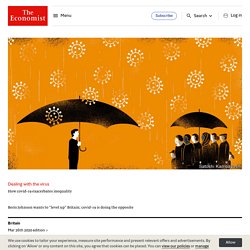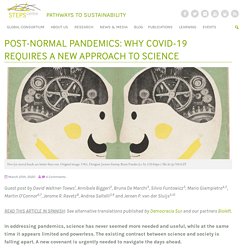

A lot of things should stay the same when this crisis ends. Subscribe to read. Covid-19 and productivity in the UK. (12 May 2020) Professor Richard Harris, Deputy Executive Dean (Research) and Professor of Economics at Durham University Business School considers the question: How will Covid-19 affect productivity in the UK?

The impact of the current world pandemic looks set to have an unprecedented impact on the world economy. The secretary-general of the Organisation for Economic Cooperation and Development (OECD) stated on the 23 March that a global recession looks "increasingly likely" in the first half of this year, "and we must act now to avoid a protracted recession". According to International Monetary Fund (IMF) Chief Kristalina Georgieva, the global economy contracted by 0.6% in 2009 as a result of the 2008 global financial crisis, but major emerging markets like China and India at the time were growing at a rapid rate; in contrast, some forecasters believe that the current the downturn could be 1.5%. Getting Britain working (safely) again.
Coronavirus: What does a 'Covid-secure' office look like? News BBC News Navigation Sections Previous Next Media player Media playback is unsupported on your device.

Four coronavirus futures. As the UK edges uncertainly into easing the COVID-19 lockdown, where might we be headed and to what kind of new normality?

At this very early stage in the responses to the pandemic, four narratives are taking shape, pointing us to quite different futures. These scenarios combine elements of continuity and discontinuity, realism and idealism, optimism and pessimism. They are not mutually exclusive. There are overlaps between them. Any of us could feel drawn to more than one at the same time. The return to normal The first future is the most superficially comforting: the return to normal – life as it was for most of us in late November 2019. The ‘return to normal’ will be more possible in countries which have responded to the crisis well in terms of minimising deaths (presuming that the apparent early successes are not undone by subsequent waves): Denmark, Greece and New Zealand might be examples.
An official campaign to get us to be completely normal again is unlikely to succeed. Dealing with the virus - How covid-19 exacerbates inequality. Editor’s note: The Economist is making some of its most important coverage of the covid-19 pandemic freely available to readers of The Economist Today, our daily newsletter.

To receive it, register here. For more coverage, see our coronavirus hub IN SOME WAYS, Britain is more united than it has been for a long time. Bickering over Brexit has been shelved. Party politics is all but suspended, after Parliament voted to shut itself down on March 25th to minimise the risk of transmission of covid-19. Neither A Black Swan Nor A Zombie Apocalypse: The Futures Of A World With The Covid-19 Coronavirus * Journal of Futures Studies.
By Sohail Inayatullah and Peter Black Is this a Black Swan? Our colleague Louis Zheng from the Shanghai FuturistCircle suggested that no one had predicted COVID 19 Coronavirus. “Is it a black swan?” He asked.[1] www.jfsdigital.org. Our response was that this is not a black swan, as a black swan event is defined as being unpredictable, a total surprise. The predictability is on a number of fronts. 1. 2. 3. 4. 5. All the above was known before COVID 19, so people working in the EID space were not surprised. Foresight, of course, is not about exact timing – that is market investment and stock trading. Culture Eats Strategy For Breakfast. Post-normal pandemics: Why COVID-19 requires a new approach to science - STEPS Centre. Guest post by David Waltner-Toews1, Annibale Biggeri2, Bruna De Marchi3, Silvio Funtowicz3, Mario Giampietro4,5, Martin O’Connor6,7, Jerome R.

Ravetz8, Andrea Saltelli3,9 and Jeroen P. van der Sluijs3,10 READ THIS ARTICLE IN SPANISH: See alternative translations published by Democracia Sur and our partners Bioleft. In addressing pandemics, science has never seemed more needed and useful, while at the same time it appears limited and powerless. The existing contract between science and society is falling apart. A new covenant is urgently needed to navigate the days ahead. On 19 May 1986, The Guardian published an essay entitled “Disasters bring the technological wizards to heel: Chernobyl, Challenger, and the Ch-Ch Syndrome”. The mortal blow seems to have been followed by a slow, agonizing death.
‘There is no number-answer’ The possibility of local economic collapse, along with mass panic and social breakdown, is quite real. How do different perspectives help? Related content. There will be no 'back to normal' The pandemic will change the world permanently and profoundly.

Even if countries can control the spread of COVID-19 in the coming months, there will be vast political, economic, social, technological, legal and environmental consequences which will last many decades. In this article, we summarise and synthesise various - often opposing - views about how the world might change. Clearly, these are speculative; no-one knows what the future will look like. But we do know that crises invariably prompt deep and unexpected shifts, so that those anticipating a return to pre-pandemic normality may be shocked to find that many of the previous systems, structures, norms and jobs have disappeared and will not return.
For this reason, adaptation and innovation are more important than ever. 7 Predictions for a Post-Coronavirus World - Marker.